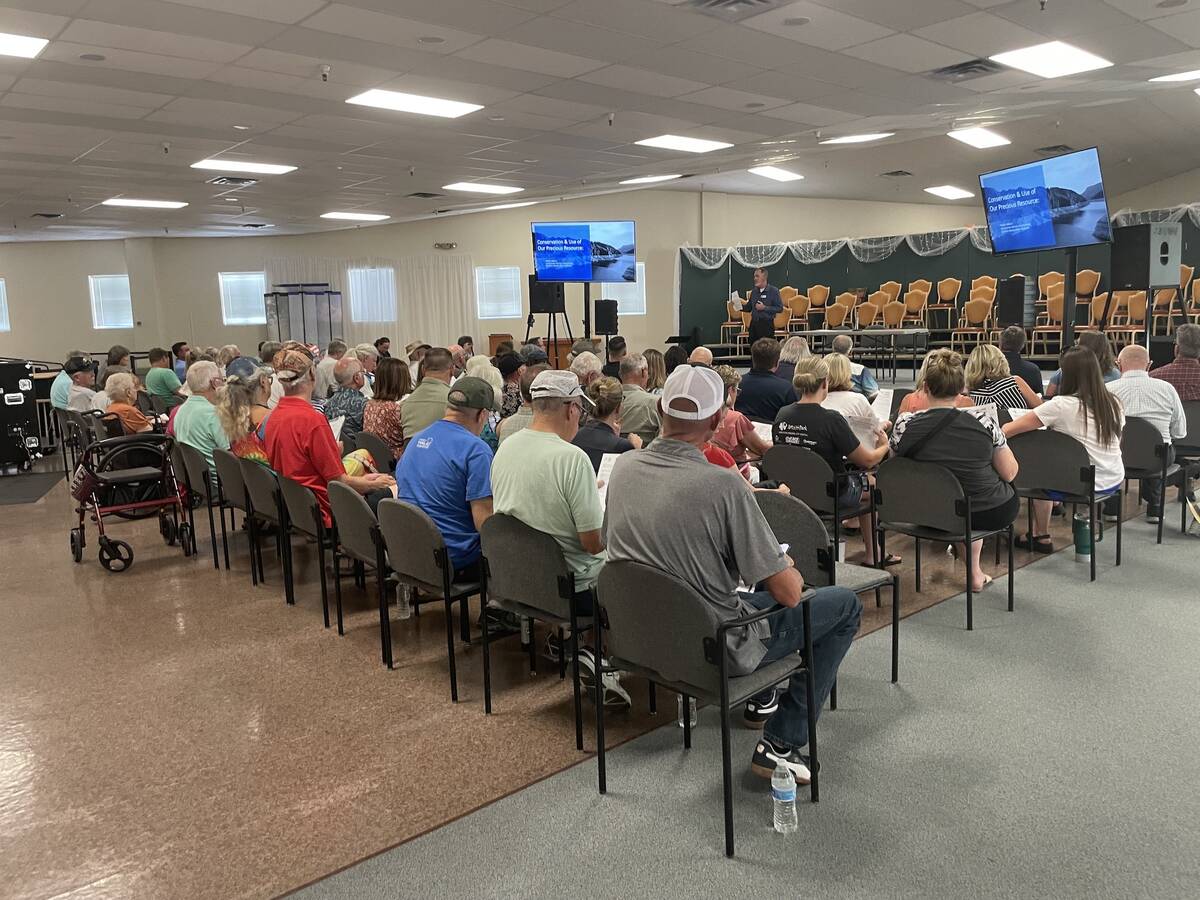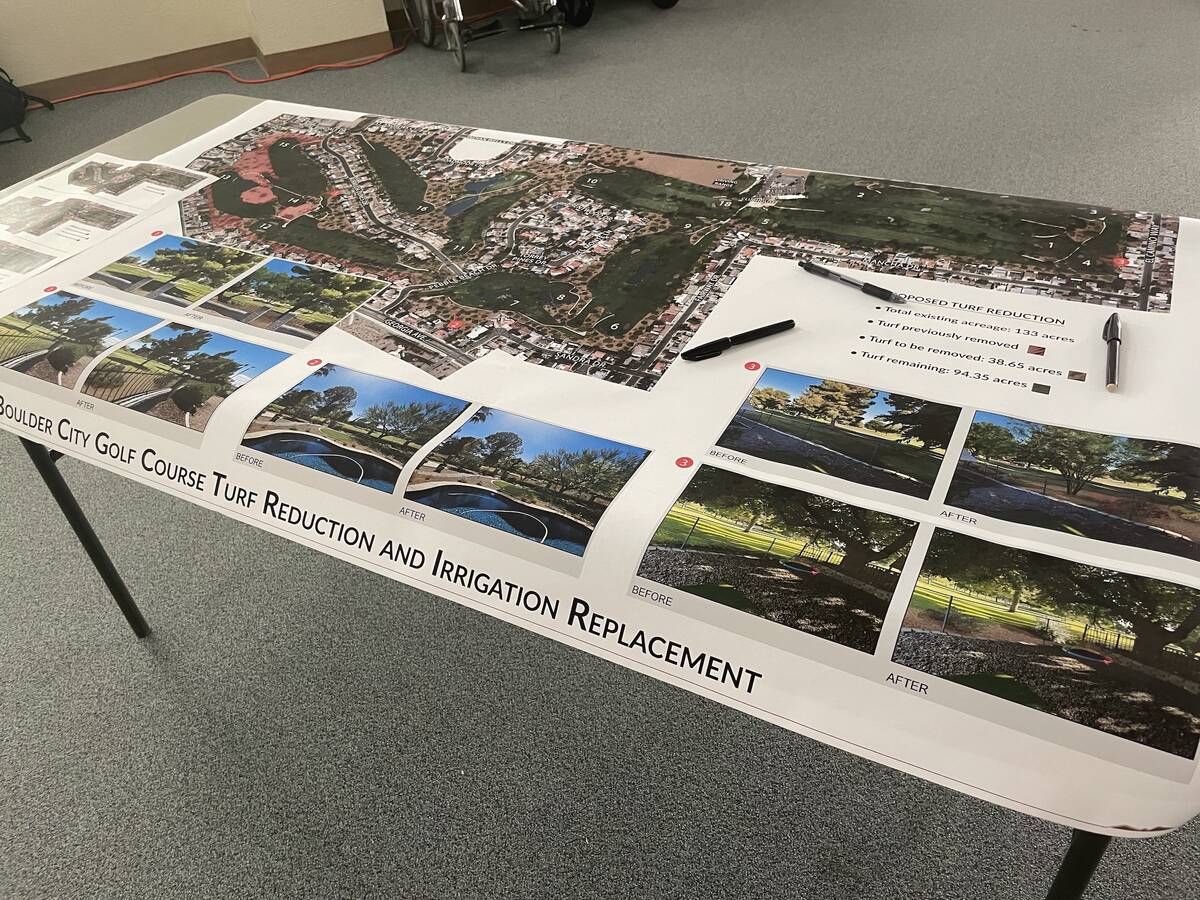Turf reduction sees pushback
The second public meeting regarding the proposed reduction in turf at the Boulder City Municipal Golf Course was envisioned as the kind of input-lite that the first meeting back in April was. But the packed room at the Elaine K. Smith Building on Monday wasn’t having it.
The idea was to have a rep from the Southern Nevada Water Authority give a presentation justifying the removal of nearly a third of the existing turf at the city-owned course in the name of water conservation. Then, the crowd would disperse to a series of tables around the room where they could look at pictures of the proposed changes and ask questions of city staff and then, finally, write their thoughts on city-supplied forms using one of the pens scattered on the tables. Then the crowd would leave and city staff would compile their written input into a presentation for the city council.
That is not what happened.
The meeting, attended by at least 80 people concerned about the proposed changes, did start with the presentation that went on for about 30 minutes.
But the character of the meeting was probably best illustrated by the struggles city staff had with the sound system before the meeting even started. As they tried to turn the system on multiple times only to have that action result in a blast of crackly static from the loudspeakers, Acting City Manager Michael Mays finally asked if everyone in the room could hear him and proceeded to lay out the format of the meeting without a microphone.
Mays was followed by Patrick Watson, conservation services administrator for SNWA, who explained the current law while giving a detailed look at water conservation efforts.
Much of the presentation centered around AB356, a law passed by the Nevada Legislature in 2021, “prohibiting use of Colorado River water delivered by the Southern Nevada Water Authority (SNWA) member agencies to irrigate useless grass (nonfunctional turf) not zoned exclusively for single-family residences effective Jan. 1, 2027.”
What is “non-functional turf”? According to the SNWA website, “Nonfunctional turf provides no recreational value, is largely decorative, or not safe to access and use. It is found throughout Southern Nevada, within business complexes and neighborhoods, schools, parks, government facilities, along community streets, and in traffic circles and medians.”
It is not the first time Boulder City has been faced with the effects of AB356. Last year, the city council approved plans to remove turf from areas along city streets and around city buildings. The public opposition was not small, with many pointing to the city’s motto of “Clean, Green Boulder City” and asking why the city should remove turf when so much new development was happening throughout the Vegas Valley just over the hill.
Ironically, a large part of Watson’s presentation appeared to fuel the protestations of residents and golfers who filled the meeting. He touted wastewater recycling as a key to Southern Nevada actually drawing far less water from the Colorado than their expected portion of the state’s allotment.
Except, Boulder City does not currently recycle wastewater.
When Watson finished his presentation and Mays attempted to get people to disperse to the tables where they were supposed to write down their thoughts, he was met with strong pushback with multiple attendees saying they had come to the meeting for answers and saying they felt like their concerns were being ignored.
The protestations centered around two issues.
First, while the golf course uses more than 100 million gallons of water per year, Boulder City currently sends more than three times that amount of wastewater to evaporation ponds in the desert while, over the hill, more than 90% of indoor water use is recycled.
The question was asked by multiple people why that wastewater could not be used to irrigate the golf course as it currently exists. Mays answered that SNWA was doing a feasibility study on several proposed methods for recycling Boulder City wastewater but that the study would not be done until later this year and that the study was only the first step in solving the issue of wasted wastewater.
The second issue brought up was that the current irrigation system at the golf course is 50 years old and is acknowledged to be leaking and inefficient. That system is set to be replaced starting in late 2025 using funding the city received from the federal government via ARPA money. These attendees contended that turf removal is premature before the irrigation system is replaced and water usage measured when the new system is in place.
The city’s response to that, outlined in an FAQ document that was included in the announcement of Monday’s meeting is that, “Replacing the irrigation system will greatly increase watering efficiency, but will not reduce water consumption enough to meet the SNWA water budget. In addition, performing any turf reduction after replacing the irrigation system would necessitate a redesign of the newly installed irrigation system, adding cost to the second project.”
As Watson outlined in his presentation, the financial penalty for going over the water budget is substantial. Exceeding the budgeted water amount means the cost of water increases between two-times and nine-times the highest rate, depending on how far over the budget the course were to go.
No schedule was given for when the council would meet to consider the concerns of those in attendance. However, the current schedule for the project calls for sending it out to bid in the fourth quarter of this year with construction (i.e., turf removal) set to begin in the first quarter of 2025.

















